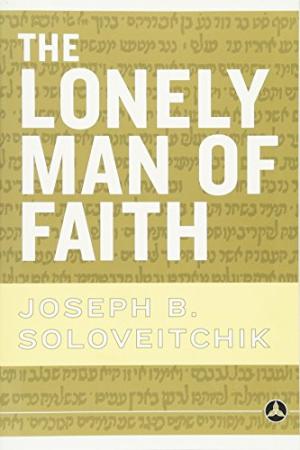 Soloveitchik, in his book The Lonely Man Of Faith and following the yahwist; describing in detail ‘Adam the first’ and ‘Adam the second’, helpfully roots the existential crisis of meaning as a primary concern of The Scriptures. Similar to Rabbi Sacks in chronicling the story of man, the meaning-seeking animal, by the metaphor of the left and right parts of the brain and Kolakowski in cataloguing the technological and mythic cores, he focuses our attention on life’s purpose and The call in its acute and uncompromising manner. The Rav includes this brief note on pages 39 and 40 of the short book as a powerful critique of the fake of faith: ‘*The Biblical account of the original sin is the story of man of faith who realizes suddenly that faith can be utilized for the acquisition of majesty and glory and who, instead of fostering a covenantal community, prefers to organize a political utilitarian community exploiting the sincerity and unqualified commitment of the crowd for non-covenantal, worldly purposes. The history of organized religion is replete with instances of desecration of the covenant.’ Before continuing on page 40 about the real deal- ”THE COVENANTAL faith community, in contradistinction to the natural work community, interprets the divine pronouncement “It is not good for man to be alone,” not in utilitarian but in ontological terms: it is not good for man to be lonely (not alone) with emphasis placed upon “to be.” Being at the level of the faith community does not lend itself to any equation.
Soloveitchik, in his book The Lonely Man Of Faith and following the yahwist; describing in detail ‘Adam the first’ and ‘Adam the second’, helpfully roots the existential crisis of meaning as a primary concern of The Scriptures. Similar to Rabbi Sacks in chronicling the story of man, the meaning-seeking animal, by the metaphor of the left and right parts of the brain and Kolakowski in cataloguing the technological and mythic cores, he focuses our attention on life’s purpose and The call in its acute and uncompromising manner. The Rav includes this brief note on pages 39 and 40 of the short book as a powerful critique of the fake of faith: ‘*The Biblical account of the original sin is the story of man of faith who realizes suddenly that faith can be utilized for the acquisition of majesty and glory and who, instead of fostering a covenantal community, prefers to organize a political utilitarian community exploiting the sincerity and unqualified commitment of the crowd for non-covenantal, worldly purposes. The history of organized religion is replete with instances of desecration of the covenant.’ Before continuing on page 40 about the real deal- ”THE COVENANTAL faith community, in contradistinction to the natural work community, interprets the divine pronouncement “It is not good for man to be alone,” not in utilitarian but in ontological terms: it is not good for man to be lonely (not alone) with emphasis placed upon “to be.” Being at the level of the faith community does not lend itself to any equation.
“To be” is not to be equated with “to work and produce goods” (as historical materialism wants us to believe). “To be” is not identical with “to think” (as the classical tradition of philosophical rationalism throughout the ages, culminating in Descartes and later in Kant, tried to convince us). “To be” does not exhaust itself either in suffering (as Schopenhauer preached) or in enjoying the world of sense (in accordance with ethical hedonism). “To be” is a unique in-depth experience of which only Adam the second is aware, and it is unrelated to any function or performance. “To be” means to be the only one, singular and different, and consequently lonely. For what causes man to be lonely and feel insecure if not the awareness of his uniqueness and exclusiveness? The “I” is lonely, experiencing ontological incompleteness and casualness, because there is no one who exists like the “I” and because the modus existentiae of the “I” cannot be
repeated, imitated, or experienced by others.
Since loneliness reflects the very core of the “I” experience and is not an accidental modus, no accidental activity or external achievement—such as belonging to a natural work community and achieving cooperative success—can reclaim Adam the second from this state. Therefore, I repeat, Adam the second must quest for a different kind of community. The companionship which Adam the second is seeking is not to be found in the depersonalized regimentation of the army, in the automatic coordination of the assembly line, or in the activity of the institutionalized, soulless political community. His quest is for a new kind of fellowship, which one finds in the existential community. There, not only hands are joined, but experiences as well; there, one hears not only the rhythmic sound of the production line, but also the rhythmic beat of hearts starved for existential companionship and all-embracing sympathy and experiencing the grandeur of the faith commitment; there, one lonely soul finds another soul tormented by loneliness and solitude yet unqualifiedly committed.”
Matthew 18:20- ”For where two or three gather together in My name, there am I with them.”
This applies to The Church generally and to the covenant of Marriage, sometimes called the domestic church. This is Play at it’s most profound, rooted in God’s gratuitous act of creation in Love, and manifests itself in the radical adventurous otherness of the sexes most fully in Marriage; as Eric Fuchs evokes in his book, Sexual Desire and Love.
